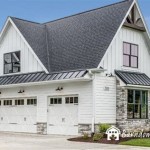Average Cost Per Square Foot To Build a Garage In Ontario
Building a garage in Ontario represents a significant investment, and understanding the associated costs is crucial for homeowners planning such a project. One fundamental metric for estimating the overall expense is the average cost per square foot. However, this figure serves as a general guideline, as numerous factors influence the final price. These factors range from the complexity of the design and chosen materials to the local labor rates and any required permits.
A basic overview of the garage construction process is essential for grasping the cost components. The process typically involves site preparation, including excavation and leveling, followed by pouring a concrete foundation. Framing the walls, installing the roof, and adding siding and doors are the next major steps. Electrical wiring, insulation, and interior finishing contribute further to the total expenses. Each of these stages involves materials and labor, each with fluctuating costs depending upon the market and specific requirements.
The average cost per square foot to build a garage in Ontario can vary widely. A simple, detached garage with minimal features will naturally cost less than a larger, attached garage with insulation, electrical wiring, and a finished interior. Generally, a range of $60 to $150 per square foot provides a reasonable estimate for a standard garage build in Ontario. However, these figures are subject to change based on the factors outlined in this article.
Key Factors Influencing the Cost Per Square Foot
Several factors significantly contribute to the fluctuations observed in the average cost per square foot. Understanding these elements allows homeowners to make informed decisions and potentially manage expenses more effectively.
1. Garage Type and Design Complexity: The type of garage being constructed has a direct impact on the cost per square foot. Detached garages, which are separate structures from the main house, often have lower costs compared to attached garages. Attached garages may require modifications to the existing house structure, potentially increasing the overall expense. Furthermore, custom designs with unique architectural features will inevitably be more expensive than standard, pre-designed garage plans. Elements such as multiple garage doors, complex rooflines, and unusual dimensions all contribute to increased costs.
The size of the garage also plays a crucial role. While a larger garage will naturally cost more overall, the cost per square foot might decrease slightly due to economies of scale. For example, the cost of the foundation and roof might be spread over a larger area, reducing the per-square-foot cost. Single-car garages will often have a higher per-square-foot cost than double or triple-car garages.
2. Materials and Finishes: The selection of materials directly affects the cost per square foot. Concrete, lumber, roofing materials, siding, doors, and windows all contribute to the overall expense. Opting for premium materials, such as cedar siding, high-end roofing shingles, or custom garage doors, will significantly increase the cost. Conversely, choosing more affordable materials, such as vinyl siding and standard asphalt shingles, can help to reduce the overall budget.
Interior finishes also play a significant role. Insulating and drywalling the garage, installing electrical outlets and lighting, and adding storage solutions all contribute to the final cost. A garage with a completely finished interior will cost more per square foot than a garage with a bare concrete floor and unfinished walls.
3. Site Conditions and Permits: The specific site conditions can significantly impact the cost of garage construction. Sites that require extensive excavation, leveling, or removal of existing structures will incur additional expenses. Soil conditions can also play a role, as unstable soil may necessitate specialized foundation work. Proximity to utilities, such as water and sewer lines, can also add to the complexity and cost of the project.
Obtaining the necessary permits is an essential part of the garage construction process. Permit fees vary depending on the municipality and the scope of the project. Furthermore, the permitting process may require adherence to specific building codes and regulations, which can indirectly affect the cost per square foot. For example, fire-resistant materials may be mandated in certain areas, increasing the cost of construction.
Detailed Breakdown of Cost Components
To gain a clearer understanding of the average cost per square foot, examining the individual cost components is essential. This breakdown allows homeowners to identify areas where they might be able to save money or allocate resources more effectively.
1. Foundation: The foundation forms the base of the garage and is crucial for its structural integrity. The cost of the foundation depends on its size, depth, and the type of concrete used. A standard concrete slab foundation typically costs between $4 to $8 per square foot. Factors such as soil conditions and the need for additional reinforcement can increase this cost. For example, if the soil requires extra compaction or if the garage will be used to store heavy equipment, a thicker and more robust foundation will be necessary.
2. Framing: The framing provides the structural support for the walls and roof. The cost of framing depends on the type of lumber used and the complexity of the design. Framing typically costs between $5 and $10 per square foot. Lumber prices can fluctuate significantly depending on market conditions, so it is important to obtain current quotes from suppliers. Complex roof designs, such as hip roofs or gable roofs with dormers, will require more labor and materials, increasing the framing cost.
3. Roofing: The roofing protects the garage from the elements. The cost of roofing depends on the type of material used, such as asphalt shingles, metal roofing, or clay tiles. Asphalt shingles are the most common and generally the most affordable option, costing between $3 and $6 per square foot. Metal roofing is more durable and long-lasting, but it also comes with a higher price tag, ranging from $8 to $15 per square foot. Clay tiles offer a premium aesthetic but are the most expensive option, costing upwards of $15 per square foot.
4. Siding: The siding provides the exterior cladding for the walls. The cost of siding depends on the type of material used, such as vinyl, wood, or metal. Vinyl siding is a popular choice due to its affordability and low maintenance requirements, costing between $3 and $7 per square foot. Wood siding offers a natural aesthetic but requires more maintenance and costs between $5 and $12 per square foot. Metal siding is durable and long-lasting, costing between $7 and $15 per square foot.
5. Doors and Windows: The cost of garage doors and windows depends on their size, material, and features. A basic garage door typically costs between $800 and $1,500 installed. Upgrading to an insulated garage door or a door with a more sophisticated design can significantly increase the cost. Windows can range in price from $200 to $500 each, depending on their size and type. Adding windows can improve the natural light and ventilation in the garage, but it also increases the overall cost.
6. Electrical and Plumbing: Adding electrical wiring and plumbing to the garage can significantly increase its functionality. The cost of electrical work depends on the number of outlets, lights, and circuits required. A basic electrical installation typically costs between $1,000 and $3,000. Plumbing is less common in garages but may be necessary if a utility sink or bathroom is desired. The cost of plumbing depends on the complexity of the installation and the proximity to existing water and sewer lines.
7. Insulation and Drywall: Insulating the garage can help to regulate the temperature and reduce energy costs. The cost of insulation depends on the type of insulation used, such as fiberglass, spray foam, or cellulose. Fiberglass insulation is the most common and affordable option, costing between $1 and $3 per square foot. Spray foam insulation provides superior insulation but is more expensive, costing between $3 and $6 per square foot. Drywalling the interior of the garage provides a finished look and helps to improve sound insulation, costing between $2 and $4 per square foot.
Cost-Saving Considerations
Building a garage represents a significant investment, and exploring potential cost-saving strategies is beneficial. Several approaches can help manage expenses without compromising the structural integrity or functionality of the garage.
1. Obtain Multiple Quotes: Gathering quotes from several contractors is crucial for ensuring competitive pricing. Different contractors may have varying overhead costs and material sourcing strategies, which can translate into different price points. Carefully reviewing each quote and comparing the scope of work is essential. It's prudent to verify the contractor's credentials, including licenses and insurance, before making a final decision. Lower bids should be scrutinized to ensure they do not compromise quality or compliance with building codes.
2. Opt for a Simple Design: Intricate designs and custom features significantly increase construction costs. Choosing a straightforward, rectangular garage with a standard roofline can substantially reduce expenses. Simplifying the design minimizes the need for specialized labor and complex material cuts, ultimately lowering the overall cost per square foot. Pre-designed garage plans can offer a cost-effective alternative to custom designs.
3. Consider DIY Options: Depending on the homeowner's skill set and available time, certain aspects of the garage construction can be completed independently. Tasks such as painting, insulation installation, and basic landscaping can be undertaken as DIY projects. However, it is critical to adhere to building codes and safety regulations when performing these tasks. Structural elements, electrical work, and plumbing are best left to qualified professionals to ensure safety and compliance. Carefully evaluating the time investment and potential risks associated with DIY projects is essential before proceeding.

Cost To Build A Detached Garage 2 Car Fixr

Cost To Build Garage 2025 Compare Home Quotescompare Quotes

How Much Does It Cost To Build A Garage In 2025 Trusscore

Cost To Build Garage 2025 Compare Home Quotescompare Quotes

Cost To Build A Detached Garage 2 Car Fixr

How Much Does It Cost To Build A Garage In 2025 Trusscore

Cost To Build A Garage In 2025 Renoassistance

How Much To Build A Garage In Homestars

Cost To Build A Garage In 2025 Renoassistance

Cost To Build A Detached Garage 2 Car Fixr
Related Posts








